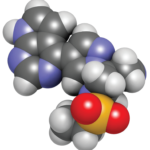Dr. Genovese expressed frustration with potential overreaction to venous thromboembolism data in a presentation at the 2018 Rheumatology Winter Clinical Symposium in Hawaii.5 Previous research from 2013 had begun to create the needed context for interpreting venous thromboembolism risk data by finding that venous thromboembolism was higher in RA than non-RA patients.6 Since then, additional research has helped broaden this context, he says.
TNF inhibitors have become the standard of care in RA, Dr. Genovese says. “It’s important that we know the potential side effects and relative risks and benefits. Certainly, we are seeing these events happen. The field is evolving and our knowledge is growing, along with our opportunities to be better informed about them.”
Larry Beresford is a medical journalist in Oakland, Calif.
References
- Desai RJ, Pawar A, Weinblatt ME, et al. Comparative risk of venous thromboembolism in rheumatoid arthritis patients receiving tofacitinib versus those receiving tumor necrosis factor inhibitors: An observational cohort study. Arthritis Rheumatol. 2019 June; 7(6):892–900.
- U.S. Food & Drug Administration. FDA briefing document: Arthritis Advisory Committee Meeting: NDA 207924 baricitinib janus kinase (JAK) inhibitor for RA. 2018 Apr 23.
- Weinblatt ME, Taylor PC, Burmester GD, et al. Cardiovascular safety during treatment with baricitinib in rheumatoid arthritis [abstract: 2352]. Arthritis Rheumatol. 2017 Oct; 69(Suppl 10).
- Pfizer Inc. News release: Pfizer announces modification to ongoing tofacitinib FDA post-marketing requirement study in patients with rheumatoid arthritis. 2019 Feb 19.
- Jancin B. JAK inhibitors for RA: Is VTE risk overblown? Anticoagulation Hub. 2018 Feb 15.
- Kim SC, Schneeweiss S, Liu J, et al. Risk of venous thromboembolism in patients with rheumatoid arthritis. Arthritis Care Res (Hoboken). 2013 Oct;65(10):1600–1607.



